When picturing the frontlines of healthcare, what images first come to mind? While visions of nurses, doctors, and emergency medical technicians may quickly materialize, many overlook one often unsung specialty: respiratory care.
Equipped with in-demand expertise, fine-tuned technical skills, and a compassionate bedside manner, registered respiratory therapists (RRTs) perform an indispensable function across care settings — treating acute and chronic breathing difficulties in patients across the lifespan.
Given the highly specialized knowledge needed to provide life-sustaining care, pursuing this career path means aspiring respiratory therapists (RTs) must earn their degree, satisfy fieldwork requirements, and pass entry- and advanced-level board examinations to become registered practitioners.
At Goodwin University, our associate degree in Respiratory Care program fosters the skills future respiratory therapists need to achieve a fulfilling career. With learning extending well beyond the confines of the classroom, Goodwin’s Respiratory Care students immerse themselves in one-of-a-kind fieldwork experiences.
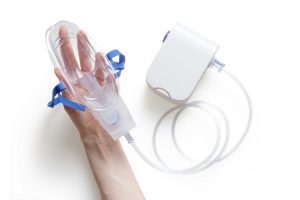
Coordinated by seasoned professional and director of clinical education Ashley Kovalik, RRT-ACCS, Goodwin’s Respiratory Care clinical opportunities prepare prospective respiratory therapists with the competence and confidence necessary to make a meaningful difference in their communities.
Respiratory Care vs. Nursing — What’s the difference?
With over a decade of experience working in the field, Ashley Kovalik notes that respiratory care is often miscast under the umbrella of nursing. “Respiratory therapists are often lumped in with nurses because there is some overlap in terms of their roles as supporters on healthcare teams,” she explains, quickly highlighting the differences between these distinct professions. “Respiratory care is close to nursing in some ways, but it’s a much more highly specialized area of care.”
Due to their expert knowledge of lung and breathing difficulties, respiratory care specialists began garnering more limelight in the wake of the 2020 pandemic. “Respiratory therapists are really coming out of the shadows post-COVID and being recognized for having a specialized knowledge that sets them apart from doctors and nurses,” explains Kovalik. While both nurses and respiratory care specialists support healthcare teams across diverse settings, nurses perform a broader scope of caregiving duties. In contrast, the specific purview of respiratory therapists exclusively surrounds pulmonary medicine.
With their understanding of all things respiratory, these professionals provide lifesaving care, such as:
- Administering breathing gases tailored to individual patient needs
- Diagnosing and treating lung and breathing problems
- Evaluating patient progress
- Educating patients about breathing conditions and treatments
- Managing highly technical equipment such as ventilators and artificial airways
- And more

A look into life as a respiratory therapist
Because respiratory care specialists must readily think on their feet, no two days on the job are the same. Likewise, respiratory therapy offers countless opportunities for career advancement. “It’s a specialty job, so there’s lots of room for growth,” Kovalik offers. According to the American Association for Respiratory Care, respiratory therapists can pursue roles in management and supervision, private care, higher education, and even corporate positions in fields like marketing and equipment manufacturing.
Beyond the breadth of opportunities at respiratory therapists’ fingertips, it’s never been a better time to take a deep breath and dive into this career path. With the Bureau of Labor Statistics projecting a 13% increase in new positions and a median annual salary of over $77,000, a future as respiratory care specialist offers job stability, financial security, and personal and professional fulfillment.
A specialized career, a specialized education
Given the highly specialized nature of respiratory care, becoming a respiratory therapist is rigorous yet rewarding, requiring an associate degree from an accredited program, 600 hours of clinical coursework, and successful completion of the National Board for Respiratory Care (NBRC) licensing exam.
Goodwin’s history of preparing future respiratory care specialists to excel in the face of these challenges is tried and true. “We typically see a 100% job placement rate in our graduating classes,” Kovalik highlights. “In winter, students graduating in our May 2024 class were already securing job placements.”
One reason Goodwin’s Respiratory Care graduates enter the field as sought-after professionals is the comprehensive coursework they complete — developing their technical skills while honing the ability to make informed, real-time decisions.
The trek to a career in respiratory care
As a 2-year associate degree program, students spend the first semester equipping themselves with the basics. “During their first semester, students have 3 classes to gain a background and build their schema for respiratory care,” Kovalik says. “They learn the basics by getting to know the gases and gaining a background in pulmonary physiology.”
Kovalik emphasizes that Respiratory Care coursework does require students to be adept at science and mathematics. “They will need to know how to calculate the pressures and volumes of gases based on different patients and their specific needs.”
She further notes that training isn’t a matter of memorizing scientific facts and data. With robust skills in chemistry, biology, and mathematics, respiratory therapists must apply their professional training in a manner that extends beyond the factual and conceptual — calling on critical thinking and problem-solving to treat each and every patient.
“Respiratory Care students often find what they’re learning in classes differs from their past experiences with math and science. It’s less about rote knowledge and memorization and more about critical thinking. We focus less on the ‘what’ and more on the ‘why’,” Kovalik explains. “They learn to address patients’ needs by working with the information and facts at hand. We encourage them to apply their learning and critical thinking to the questions and issues they’ll face in the field.”
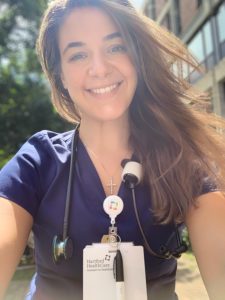
Ready to jumpstart your journey to a rewarding career in respiratory care? Download your free Respiratory Care Get Started Guide and learn more about earning your degree today!
One-of-a-kind clinicals
Respiratory Care students don’t simply gain career-specific knowledge — they also must apply their learning in the field through 600 hours of hands-on clinical experience. “We begin assigning clinicals during the second semester of the program,” Kovalik delineates. “Clinical offerings vary, ranging from sleep labs to home care rotations.”
Kovalik notes that students ease into their fieldwork assignments. “We don’t have students work in sensitive areas like pediatrics at first. They start by practicing fundamental skills in patient care at Hartford Hospital or in other special care settings.”
While fieldwork isn’t a unique requirement for respiratory therapists in training, Goodwin takes a one-of-a-kind approach to clinical rotations — designing an educational experience tailored specifically to University students. “We don’t send students off to work with the hospital staff. At Hartford Hospital, we have our own staff who are specifically dedicated to working with our students,” Kovalik shares.
She highlights the competitive advantage this model has compared to other Respiratory Care programs. “Staff therapists can be too overwhelmed to dedicate time to training students. The 1-1 support we provide Goodwin students throughout their clinicals makes a difference,” she notes. “It’s less watching and more doing. They won’t just be told to shadow someone, nor will they get sent home early by staff. They get extensive, hands-on, educational training.”
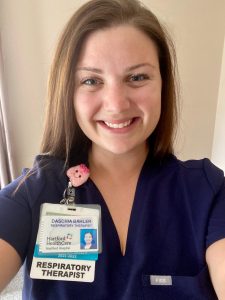
Becoming a respiratory therapist at Goodwin
Although developing professional confidence takes time, Goodwin’s program and immersive clinical experiences demonstrate an exemplary history of preparing budding respiratory care specialists with the knowledge and training they’ll need in their careers. Ashley Kovalik emphasizes that the road to achieving a career as a respiratory therapist isn’t always easy but is achievable with commitment, a positive attitude, and a growth mindset. “A lot of work goes in, but you should have no problem if you put in the time and effort,” she reiterates.
To make the most of your Respiratory Care education, Kovalik advises students to not only utilize faculty and staff as a resource but to build relationships with colleagues. “If you rely on your classmates, you can form study groups and help one another as fellow students.”

With unique fieldwork opportunities, expert instruction, and a supportive classroom environment, Goodwin sets itself apart as the perfect place to train as a respiratory therapist — garnering holistic, collaborative, and career-ready learning while preparing you to make a meaningful difference in healthcare.
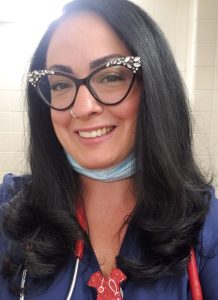
Ashley Kovalik, RRT-ACCS, studied respiratory care at Manchester Community College before pursuing her bachelor’s degree in allied health at Charter Oak State College. With over a decade of respiratory care experience in settings ranging from pediatric to private care, Ashley has garnered expertise working with diverse patient populations.
Prior to becoming Goodwin’s director of clinical education for Respiratory Care, Ashley was a clinical instructor for the program. In addition to training students and preparing them for licensure, Ashley continues working as a respiratory therapist and Extracorporeal membrane oxygenation (ECMO) specialist at Hartford Hospital.
Your journey to becoming a patient care professional begins at Goodwin. Take the first step today — learn more about becoming an expert respiratory therapist through Goodwin’s one-of-a-kind Respiratory Care program!
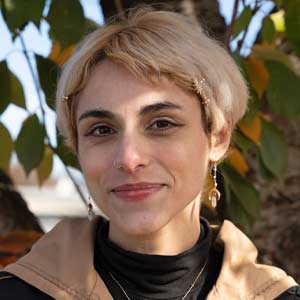
Bri Gagné is a marketing content writer at Goodwin University, bringing backgrounds in literary studies, creative storytelling, Universal Design for Learning (UDL), and social justice. They earned their bachelor’s degree in English Literature and Film Studies from University of Connecticut and a master’s in education from Eastern Connecticut State University.
After teaching English abroad and locally, Bri transitioned to a full-time writing career, contributing to the University’s educational narratives and brand-building efforts. They plan to begin their Master of Fine Arts in creative writing in 2025.

